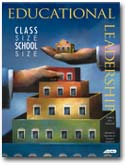September 2002
Do Students Care About Learning?
Teachers, administrators, parents, and communities care deeply about education. But do the students care? This issue will examine whether students are disengaged from their own learning and why. What are educators doing to make education exciting and relevant for all students? How are teachers transforming students from disengaged learners to active participants? How are schools preventing students from dropping out? How are educators reaching diverse populations?
Deadline: April 1, 2002
October 2002
The World in the Classroom
How are we extending students' awareness of the world, opening up to them its diverse heritage of human thought and action? How do we balance patriotism with international understanding? How can we best teach about the world's environments, literatures, religions, cultures, geography, political structures, languages, and history? How can we foster empathy for others, multiple perspectives, and cultural sensitivity? How are schools encouraging students to think critically about their role in the world? What can we learn from one another?
Deadline: May 1, 2002
November 2002
Reading and Writing in Content Areas
Many students fall behind because their content-area instruction assumes literacy skills they don't have. This issue will explore ways that schools are integrating reading and writing instruction in the content areas. Areas of inquiry will include: why content-area teachers should assume the responsibility of teaching literacy; challenges to integrating content-area literacy into instruction; using a variety of resources, including trade books, newspapers, and technology; teaching metacognitive strategies; the reading-writing connection; working with low-achieving students; assessing students' abilities; teaching students to read strategically; working with specialists and resource teachers; using technology; and ways to encourage students to read.
Deadline: June 1, 2002
December 2002/January 2003
Equity & Opportunity
How do schools provide an equitable education and opportunities for achievement for all students? Are standards and sanctions helping or hurting high-needs students? How are schools making sure all students have access to Advanced Placement courses, higher-level mathematics, and technology? How are funds and staff being allocated to ensure that all students receive the best possible education?
This issue will examine how racial, ethnic, socioeconomic, and gender differences affect students and what is being done to provide opportunities for all to learn.
Deadline: July 1, 2002
February 2003
Using Data to Improve Student Achievement
In the midst of increasing assessment and accountability, many educators are asking questions such as, What data should we collect? How do we prioritize our data collection? What are we doing with test results? This issue will address how teachers are using data to make instructional changes and how schools are using data to assess the effectiveness of school programs. How do principals get teachers to “buy in” to data-based decision making? How are educators effectively communicating data to different audiences? How do we collect and use information that isn't quantifiable—for example, student work? What role does diversity play in data collection? What data do schools in other countries collect, and what do they do with that information?
Deadline: September 1, 2002
March 2003
Creating Caring Schools
This issue looks at how to educate students to become caring, empathetic adults. How do we help students discern and address moral issues? What are school leaders doing to foster positive school cultures? What strategies are teachers using to create safe and supportive classrooms? We are interested in articles about character education, service learning, conflict management, drug prevention, violence prevention, dealing with bullies, encouraging cooperation, teaching leadership skills, developing interpersonal skills, and creating physical environments that foster a positive school climate.
Deadline: October 1, 2002
April 2003
The First Years of School
What school programs and practices are most effective in getting children off to the best start in school? Topics will include: promoting school readiness in pre-K and beyond; transition programs to support students and their families as they enter kindergarten; scheduling options; kindergarten/first grade centers; looping and multi-age grouping; staffing practices such as use of team teachers; creating child-sensitive classrooms; dealing with diverse student ability levels and needs; early intervention to prevent failure; appropriate assessment for young children; supporting young children's health and social/emotional development; and parent involvement.
Deadline: November 1, 2002
May 2003
Keeping Good Teachers
This issue will explore ways that districts are attracting the best people and keeping them from dropping out of the profession. How are we recognizing quality in practicing teachers and in teacher candidates? How are schools creating environments that attract and retain the best teachers? What do successful teachers identify as the most important conditions for job satisfaction? What do teachers who have left the profession say about their reasons for leaving? What role does compensation play in retaining teachers? What is the role of professional respect, and how it can be fostered? What kinds of induction systems decrease the early attrition rate? How can veteran teachers be renewed professionally?
Deadline: December 1, 2002
